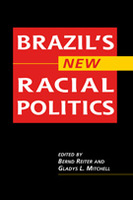Fact and Myth: Discovering a Racial Problem in Brazil
Kellogg Institute
Working Paper #173
April 1992
23 pages
Thomas E. Skidmore, Emeritus Professor of History
Brown University
This paper examines prevalent attitudes towards race in Brazil’s mutiracial society. The author notes that, while there is a considerable literature on slavery and the struggle for abolition, relatively little work has been done on race in Brazil today even though color continues to correlate highly with social stratification. He argues that historically the Brazilian elite has been able to hold to a belief in white superiority and at the same time deny the existence of a racial problem by adopting an “assimilationist” ideology. This begins with the late nineteenth- and early twentieth-century thesis that Brazil was progressively “whitening,’ and continues up to the present day with the widely held view that disproportionate Afro-Brazilian poverty is a legacy of socioeconomic disadvantage and not a result of discrimination. This official ideology has strongly affected the availability of data until recently and has generally been a dominant influence on mainstream academic research on race. The author traces the emergence of criticism of the “myth of racial democracy” from Afro-Brazilian militants and some social scientists, and gives a brief overview of the existing research on contemporary Brazilian race relations. He concludes by outlining a future research agenda for Afro-Brazilian studies.
Every Brazilian and every perceptive visitor knows that racial terms are not clearly defined in that society. The lesson is especially striking for North Americans and Europeans, who are used to a conventional black/white (or, at least, white/nonwhite) dichotomy. That polarization was institutionalized in U.S. racial segregation, a polarity that Europeans, unused to home-country contact with nonwhites in the modern era, instinctively understood.
But Brazil, like most of Latin America, is different. In the Caribbean and Latin America the European colonizers left a legacy of multiracialism, in spite of early attempts to enforce racial endogamy, i.e., the prohibition of marriage outside the same racial category. Multiracial meant more than two racial categories—at a minimum, three. The mulatto and the mestizo became the “middle caste,” with considerable numbers attaining free legal status, even under slave systems. The result was a system of social stratification that differed sharply from the rigid color bifurcation in the U.S. (both before and after slavery) and in Europe’s African colonies. There was and is a color (here standing for a collection of physical features) spectrum on which clear lines were often not drawn. Between a “pure” black and a very light mulatto there are numerous gradations, as reflected in the scores of racial labels (many pejorative) in common Brazilian usage.
This is not to say that Brazilian society is not highly color conscious. In fact, Brazilians, like most Latin Americans, are more sensitive to variations in physical features than white North Americans or Europeans. This results from the fact that variations along the color spectrum, especially in the middle range, are considered significant, since there is no clear dividing line.
The question of accurate color terminology is especially difficult when discussing Brazil. The terms used in the Brazilian census—preto, pardo, and branco—translate literally as “black,” “brown,” and “white.” The principal distinction in this paper will be between white and nonwhite, the latter including preto and pardo. To designate the latter, i.e., nonwhite, the term used here will be “Afro-Brazilian” rather than “black,” since preto (the literal Portuguese translation of “black”) is a far more restrictive (often pejorative) label in Brazil. The increasingly common term used in Brazil (in the mass media, for example) for nonwhite is negro, but the English equivalent is archaic for an English-speaking audience. It should also be noted that negro is the label that Afro-Brazilian militants use in their campaign to convince all Brazilian nonwhites, above all mulattos, to “assume” their color and not succumb to the belief, a la whitening ideology, that a lighter nonwhite can hope for greater social mobility.
In sum, Brazil is multiracial, not biracial. This makes its race relations more complex than in the U.S., and more complex than most Europeans expect. The most important fact about this multiracial society, from the standpoint of those wishing to study it, is that until fifteen years ago there were virtually no quantitative data with which to analyze it. Between 1890 and 1940 neither the Brazilian government nor Brazilian social scientists considered race to be a significant enough variable to justify recording it in the national census. Even when race was later included, as in 1950 and 1960, until the 1976 household survey (PNAD) there were no data by race on income, education, health, and housing (there were limited data on marriage, fertility, and morbidity).
Read the entire paper here.

